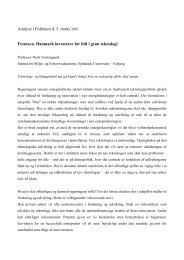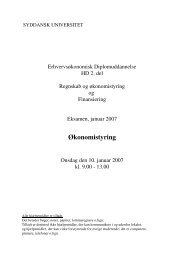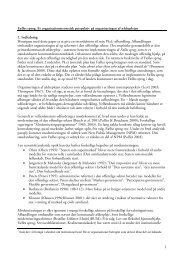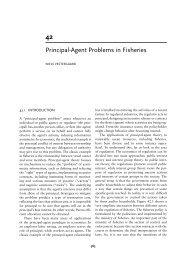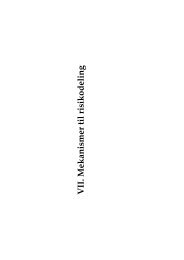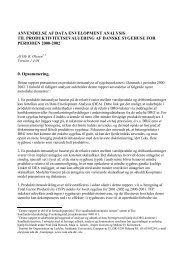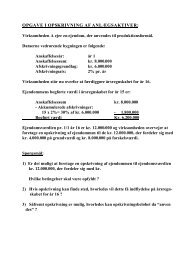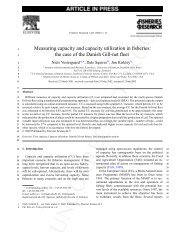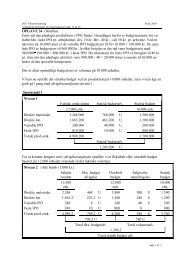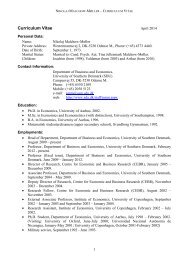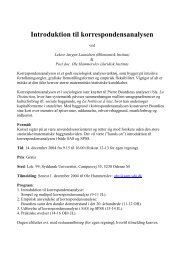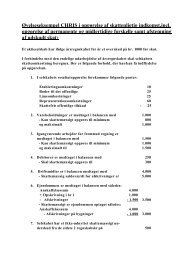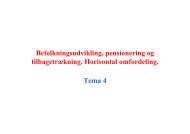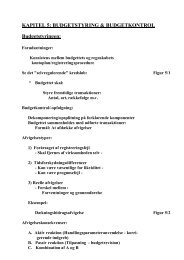Development of Parties and Party Systems in ... - lah@sam.sdu.dk
Development of Parties and Party Systems in ... - lah@sam.sdu.dk
Development of Parties and Party Systems in ... - lah@sam.sdu.dk
- No tags were found...
You also want an ePaper? Increase the reach of your titles
YUMPU automatically turns print PDFs into web optimized ePapers that Google loves.
<strong>in</strong>fluence on the local level, should be ma<strong>in</strong>ta<strong>in</strong>ed accord<strong>in</strong>g to the party. The strongholds <strong>of</strong> theparty has been the small towns <strong>and</strong> th<strong>in</strong>ly populated areas. For those reasons PSL could not assistthe government as regards the plans about reduc<strong>in</strong>g the number <strong>of</strong> regions (voivods) <strong>and</strong> <strong>in</strong>troduce anew adm<strong>in</strong>istrative middle level (the powiaty’s).The attitudes among the electorate liv<strong>in</strong>g <strong>in</strong> rural areas have been <strong>in</strong>terventionist <strong>and</strong> egalitarian.The farmers have typically been conservative m<strong>in</strong>ded <strong>and</strong> only rarely satisfied with the policyconducted by the governments, be they right or left. Many farmers felt that their jobs have lostprestige after 1989 <strong>and</strong> therefore expressed some “nostalgia” for the period before 1989, especiallythe “good 1970s” under Edward Gierek (“the retrospective utopia”).At the 1993 election PSL obta<strong>in</strong>ed some support from those farmers who before 1989 had beenemployed on the state own farms (PRG). The electoral success <strong>of</strong> PSL took place at the expense <strong>of</strong>those rural parties that had their orig<strong>in</strong> <strong>in</strong> the Solidarity movement. Thus at the 1993 election PSLga<strong>in</strong>ed about 40 percent <strong>of</strong> the votes among farmers, however, among less educated only 17 percent(Knuzewski, 1998:151). On the other h<strong>and</strong>, at the1997-election many former PSL voters voted SLD<strong>and</strong>, as regards right-traditionalist m<strong>in</strong>ded people, Election Alliance Solidarity (AWS). At the 1997election AWS’ share <strong>of</strong> the farmers vote was 33 percent or almost the same share that voted SLD<strong>and</strong> first on the third place we f<strong>in</strong>d PSL.Thus the 1997 election- <strong>and</strong> later the 2001 election- punctured the myth that the farmers <strong>and</strong> theelectorate <strong>in</strong> rural areas constitute a well discipl<strong>in</strong>ed <strong>and</strong> stable voter group at every nationalelection br<strong>in</strong>g<strong>in</strong>g PSL <strong>in</strong> a key position. The 26 seats <strong>in</strong> the parliament elected <strong>in</strong> 1997 were not <strong>in</strong>itself impress<strong>in</strong>g, but enough to keep the party over the water surface. Most important was that theparty was a well organised unity <strong>and</strong> that representation <strong>in</strong> the municipial <strong>and</strong> regional councils kept<strong>in</strong>tact. In other words, the PSL had ga<strong>in</strong>ed an ”immune defence” <strong>in</strong> case <strong>of</strong> a temporary politicalsetback.The power struggle between Jagielski <strong>and</strong> Pawlak <strong>in</strong>tensified after the 1997 election, but theresignation <strong>of</strong> Pawlak as the party chairman did not usher a policy-change. Jagielski took thedecision to form his own peasant party, but without any success. Work<strong>in</strong>g <strong>in</strong> opposition PSL triedto rega<strong>in</strong> the voters the party lost to AWS at the 1997 election based on the calculation that it waseasier to recapture dissatisfied AWS votes than ga<strong>in</strong> votes from left w<strong>in</strong>g parties. At that time alsoSLD was <strong>in</strong> opposition to the government <strong>and</strong> like AWS not responsible for unpopular laws <strong>and</strong>policy <strong>in</strong>itiatives.After the 1997 election PSL accused AWS <strong>of</strong> giv<strong>in</strong>g <strong>in</strong> to the liberal <strong>and</strong> pro-EU Freedom Union(UW). Especially the m<strong>in</strong>ister <strong>of</strong> f<strong>in</strong>ance Leszek Balcerowic was accused <strong>of</strong> conduct<strong>in</strong>g an asocialneo-liberal policy damag<strong>in</strong>g for the rural areas <strong>and</strong> the employment <strong>in</strong> general 62 . Accord<strong>in</strong>g to PSLthe AWS-UW government’s policy onesidedly focused on combat<strong>in</strong>g <strong>in</strong>flation 63 . For that reasonseveral times PSL put forward votes <strong>of</strong> non-confidence to the m<strong>in</strong>ister <strong>of</strong> f<strong>in</strong>ance <strong>in</strong> the parliament.In short, to a great extent the policy dem<strong>and</strong>s <strong>of</strong> PSL have focused on limitations on sale <strong>of</strong> realproperty to foreigners, rejection <strong>of</strong> the new municipal <strong>and</strong> regional reform <strong>and</strong> more state support tothe family hold<strong>in</strong>gs, also <strong>in</strong> case <strong>of</strong> negotiations about a revised constitution. Accord<strong>in</strong>g to the party,the alternative to the AWS-UW economic policy was an active export orientated <strong>in</strong>vestment <strong>and</strong>62 See e.g. Jaroslaw Kal<strong>in</strong>owski, ”Proponujeme tzecia droge”, Rzeczpospolita, 16 January 1999.63 Interview with Kal<strong>in</strong>owski <strong>in</strong> Gazeta Wyborcza 11 February 1999:14.75



